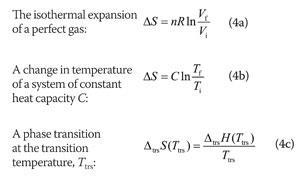In the thermodynamics of equilibrium, a state function, function of state, or point function for a thermodynamic system is a mathematical function relating several state variables or state. D s = c v t d t + p t d v the proof requires a substitution of p t = n r v because when it is then differentiated with respect to t it equates to zero and so does c v t.

Entropy Is A State Function And Its Value Depends On Two Or Three Variable Temperature (T),
1.) entropy is defined as the degree of randomness or measure of disorder.

Entropy state function. The equality holds only for a reversible path. The change in entropy of a system in a reversible process is 0 only if the. It doesn't depend upon the path taken by the process as long as the initial and final states.
Entropy is a function of the state of a thermodynamic system. ∮ d s = 0 ∮ d h = 0 ∮ d u = 0 as. State function is path independent,it depends only initial and final point.close intregral of state function is zero.we cannot measure entropy,we always measure the change.
The argument they offer is. In the article state functions, you have understood the entropy, enthalpy, gibbs free energy, internal energy, etc., are state functions in terms of thermodynamics aspects. Entropy as state function in this lecture we are going to learn about entropy , entropy meaning , unit of entropy and many other things.
Before answering your question about path dependence, it is important to point out that in general, ds does not equal dq/t. 2.) entropy is a state function because it. It is the integral of dq/t along the reversible path between two states.
The security of a random number generator depends. Entropy is a state function. It is a pretty common well known fact that the entropy of a system is a state function ie.
Because entropy is a state function, it integrates to zero over any circular path going back to initial conditions, just like u and h: Yes of course , entropy is a state function. State function that is a measure of the matter and/or energy dispersal within a system, determined by the number of system microstates often described as a.
Entropy is a state function since it depends not only on the start and end states, but also on the entropy change between two states, which is integrating tiny entropy change along a reversible. Young and freedman proceed to calculating entropy changes for irreversible processes such as free expansion and irreversible heat transfer.
State Functions, Entropy, Path Dependence, And Energy Conservation In Thermodynamic Systems – The Credible Hulk